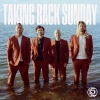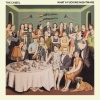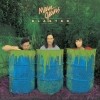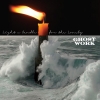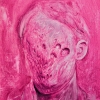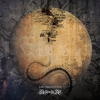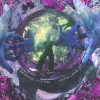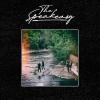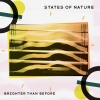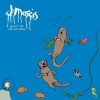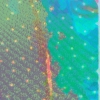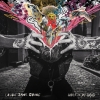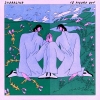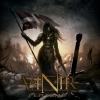author AP
date 25/03/12
When Machine Head brought their "Eigth Plague Tour" to Denmark in November last year, we had the unique opportunity to interview the band's guitarist, Phil Demmel, about the band's history, a transcript of which you can find below. My apologies for this being posted so late.
RF.net: Upon its release, “Burn My Eyes” became the bestselling debut album Roadrunner Records had released to date. Did you, at the time of writing, believe that what you were working on would become one of the most crucial metal albums of that decade?
Phil: I wasn't in the band at the time obviously, but I suppose I know the history of the band quite well. They were more concerned with just getting out the aggression that they had at the time. They didn't have any global aspirations or anything. I think that they wanted to... I remember Rob and Adam saying they just wanted to play the local Slayer show when they came through, and sell X amount of records. They didn't have any aspirations other than that. They just wanted to play.
RF.net: As you just mentioned, most of the lyrics on “Burn My Eyes” come across as angry and resentful, just as the music was referred to as “a bone-shattering exercise in brutality” by Allmusic. Could you elaborate a bit on the inspirations underlying the album?
Phil: Yeah, there was a lot of... They weren't the most well off band in the world. They were kids in their mid to late 20s, and they were selling drugs and getting by and doing speed; a couple of the guys were out of reform schools. So there was a lot of bitterness towards people, and having to beat up the pizza guy to get food. They would get in fights four or five times a week; they would go to shows and just get into fights, so I think that just kind of translated into the music at the time.
RF.net: In its wake, Machine Head embarked on a two-year touring cycle, first supporting Slayer, and then headlining the same venues a year later. Was this a revelatory period for the band in terms of realizing their full potential?
Phil: Yeah, I think that was a big eye opener for them when that happened, to come over that quick right after that happened. They knew they were onto something special at that point. Before it was just a happy to be here type deal, and then came the responsibility of we've got a shot at doing something special here.
RF.net: This was also a period during which then-drummer Chris Kontos was fired from the band because he was unable to keep to touring commitments. Have you ever felt exhausted from touring to a degree that made you consider throwing in the towel?
Phil: There was a period. My father died four years ago when I was on tour, and we were just beginning a three-year touring cycle. My health was really suffering because of it: I was having these fainting spells - I passed out a few times on stage - and we had to cancel a couple of shows. So there was a point where I felt like I could really hurt myself, or I could really hurt somebody else. So yeah, I've been to the point where I questioned my ability to be on the road.
RF.net: So what made you stay?
Phil: I quit drinking for about six months, and all the feelings that I was feeling from my father's death hit me like a sledgehammer. But I dealt with them, instead of numbing them down and putting them off. I dealt with them, got closure on them, and was able to move on.
RF.net: I have noticed that whenever you play shows, “Davidian” and “Old” are always on the setlist, while the remaining songs from the album are rarely played. Do these two songs have a special significance to you, or do you include them simply to meet fan expectations?
Phil: "Davidian" has been a song that has always been included in the Machine Head set. It's the anthem; it's what they were best known with back in the day. But we just the Rockstar Mayhem festival in the States where we didn't play it. I mean, we only had 35 minutes, so we decided to play "Locust" and close with "Halo", and just kind of make a statement that these are the current songs, and this is the band we are right now. And it didn't seem to be missed that much. "Old" is a good mid-paced, jumping song. We try to mix it up, because the set has to flow. So you can't just have all burning tunes. You have to let people relax for a minute. You have to let them sing, take them down, and bring them up.
RF.net: But what about the other songs from that album - do you ever play those live?
Phil: Yeah. I mean, we play "None But My Own". "Blood for Blood" gets a little muddy because it's so fast. But we've played all the songs since I've been in the band.
RF.net: Did the critical acclaim surrounding “Burn My Eyes” exert any pressure on your recording of your second album, “The More Things Change”?
Phil: I think that they felt a lot of pressure on that record, and they tried to do the same formula that they did on "Burn My Eyes". They tried to replicate a lot of what was happening on "Burn My Eyes" for the next one. I mean, I hear them say that, but as a fan listening to the record, I don't hear the similarities. It's still brutal, but there's different elements; it seems like there's more hardcore elements on "The More Things Change".
RF.net: After showing up to a practice session late, high on methamphetamine, and having an altercation with the rest of the band, your guitarist at the time, Logan Mader, quit the band, and was replaced by Ahrue Luster, who has since moved on to play for Ill Niño. His arrival in the Machine Head line-up coincided with a significant reinvention of your sound on “The Burning Red” and “Supercharger”, leading many people to believe it was his nu-metal influence that shaped the album and throw heavy criticism at it, especially at the rapping, perceiving the difference as selling out. The album nonetheless became the best-selling Machine Head album to date. Were you surprised by the sudden criticism following the praise surrounding the previous two albums?
Phil: I think that, especially the press over here, they build you up to break you down. There was definitely a change in the style. I forget what the quote is, but to make any kind of change, you have to be considered a fool to take these big steps, so I think they went out on a limb, and they were expecting some sort of backlash.
RF.net: What factors influenced the change in your image and musical direction?
Phil: There was a lot going on at the time. You know, the band was out on tour with bands like Slipknot and Coal Chamber, and things were changing; KoRn was getting big. So I think that there was an influence from what was current going on. The one thing about this band is it's always changing from record to record. Also Rob and Adam have always been into hip hop - that has always been an element in the music - and it kind of filtered into what they were doing at the time. They were also on a lot of drugs at the time as well, and I think that they were just really trying to instill all these effects and all these weird sounds going on - and try to sound current.
RF.net: Despite the commercial success of “The Burning Red”, and winning the hearts of many new fans particularly with the song “The Blood, The Sweat, The Tears”, few of the songs from these albums see the live setting today. Why are you less keen on playing these songs live?
Phil: No, we've played "The Burning Red", we've done "The Blood, The Sweat...", we've done "Exhale the Vile" - we brought that on the last tour - so there's three or four songs that we've played from that. And you know, "Exhale the Vile", that's a song that could have been on this new record. I mean, it's fucking heavy!
RF.net: The music video for “Crashing Around You”, which was released in the weeks after the September 11th attacks, caused a wealth of controversy for its depictions of falling buildings and ultimately lead Roadrunner Records to drop your funding due to a lack of promotion. Were you conscious at the time that the video might stir up mixed feelings given the state of shock the nation was currently in?
Phil: Yeah, absolutely. After that it happened, the video had obviously been done. And it was after the events that we thought we couldn't actually release it. The whole country was grieving, and going through this weird, weird time. We would look at people differently: you would see a Muslim in the streets, and it was like after the Rodney King riots, you know the black and the white - there was just tension there. And people just didn't know how to act or react. So the fallout from that was us and Roadrunner parting and going our separate ways after doing a deal on "Hellalive". It was time to move on.
RF.net: What effect did the attacks personally have on you?
Phil: It didn't feel real, because I'd woken up in the morning and turned on the TV and the buildings were gone. I thought, "yeah, somebody hit the buildings, but there's nothing there?". I just saw smoke. So it was shocking. And after, it just didn't seem right. There are conspiracy theories and all that, and I don't believe in everything I'm told about how it happened. But that's a whole separate interview!
RF.net: As a result of parting ways with Roadrunner, you recorded “Through the Ashes of Empires” without a label. Was the writing process different as such?
Phil: We signed contracts in the studio, so yeah, we were recording without a label, really. I think that they were going and trying to get signed on four songs, which wasn't really happening. They were being told "hey, we need a radio single from you" and "we need a couple of singles from you" or whatever, so I think that there was this whole "what do we do?" atmosphere. It was starting to become that other agenda, not writing for themselves. I think that they were having a meeting about what they were going to do - Rob almost joined Drowning Pool... well, he didn't
almost join Drowning Pool, but thought about it when he was offered - and Dave decided that he wanted to be in a metal band; he wanted to be a heavy band and write fucking heavy songs. So they were writing as a three-piece. I had filled in for them a little bit, but I was taking care of some other stuff and couldn't commit. "Through the Ashes of Empires" was them just writing for themselves, geeking out, and when I joined, I brought another element to the writing, and we were geeking out and me and Rob were writing these weird harmonies and filling that out.
RF.net: Most people agree that it marked a return to form for Machine Head. Do you personally also see the album as pivotal to your career as a band?
Phil: Definitely. It was the comeback record, you know? I mean, they were still drawing; they sold out the Brixton Academy in London on the Hellalive tour. The fanbase was always increasing; it was always increasing, it was always getting better. But the album sales and the critics' view of what the band was about was at a lull. But people were coming out to the shows more and more and more, and it continued to be that way. So that was the comeback album.
RF.net: It also paved the way for the most critically acclaimed, and in many ways the most successful Machine Head album to date, “The Blackening”, with some people likening it to “Master of Puppets”. Were you conscious at the time of writing that you had something extraordinary in your hands?
Phil: We knew we wrote something special. It was my first record that we wrote with me involved from the beginning, from the outset of writing. We knew that we were on fire writing-wise. We wrote "Seasons Wither" after "Through the Ashes of Empires" came out here - it came out six months later in the States and included "Seasons on Wither" on there - and that was a tune that I helped write. So we knew that we were on fire with our writing. We knew we had some epic-sounding tunes, and we couldn't expect after what happened that the thing would blow up, but we knew we had something special.
RF.net: Was it a conscious decision to move into writing songs that were longer and of a more progressive nature than past efforts?
Phil: No, it was just what came out. We would be playing a tune - I'm the stopwatch guy in the band, and I'd be tracking the song and how long it is - and holy shit, we're going into "Halo" and it's going 7½, 8 minutes, 9 minutes; fuck, you know? And I said, "Hey, you know that was
10 minutes?" And they said, "we don't care, that's what it is."
RF.net: Given the length and complexity of many of the songs, was it an especially difficult album to write and record?
Phil: To record, yeah. To write, it's... The song isn't done until it's done. You know, we took a song like "Wolves", which has so many parts in it, and we tried to take some parts out and try to filter ourselves, and it just didn't feel right. Why do we have to take it out? We like it. People seem to like what we like, and if they don't, then they don't have to buy the record. They're longer songs, so you're essentially recording two songs in one, for some other band, so it takes longer, for sure.
RF.net: Is it difficult at all to perform those songs like "Clencing the Fists of Dissent" live?
Phil: Yeah, they're 10 minutes, and when we play them live, the things are strung out, so it's like 11 minutes. And then we go right into "Imperium", and then right into "Beautiful Mourning". So we're 20 minutes into the set and we haven't stopped yet. So it does take a toll on us; it's long and it's hard.
RF.net: To me, “Unto the Locust” feels more immediate in its rewards than “The Blackening” and comes across as instantly memorable. How do you personally feel your music has evolved between the two albums?
Phil: I think that there's a lot of similarities between the two in the sense that they are brutally heavy and melodic. The difference is that "Unto the Locust" is more grown up. We've honed our skills, and performance-wise it's head and shoulders above "The Blackening". The hooks and the vocals are just... it's the next step. It's us growing up.
RF.net: Listening to the lyrics, “Unto the Locust” is also a much more personal album than your past works. What inspired you to write about yourself with such naked honesty?
Phil: I helped Rob a lot with the lyrics on this record. I think that "The Blackening" was more of a rebellion in a global sense, while "Unto the Locust" is a rebellion in a personal sense. It's more of a standing up for what's morally correct. A song like "Locust" - I came up with the concept, and it's about people that I've encountered throughout my life. It's about just knowing that good has to be right. You can't treat people like this and get away with it. The universe is going to come around, and karma is going to strike you down. Vengeance might not be from my hand, but it's going to happen.
RF.net: The song “Darkness Within” has become the talk of the town because of its atypical nature compared to past Machine Head songs, but overall the reception seems to be overwhelmingly positive. It is also one of the most personal songs you have ever written. What does the song mean to you on a personal level?
Phil: I think it's an ode to music. This is our life. I was brought up a Christian, and I still have Christian based beliefs and faith, but music is our salvation. Music drives our moods, and is a salve for our wounds, and music is our religion. On the other hand it's also an ode to our sons, too, while we're on the road, and our music is kind of like, when we've needed it, it's there. It's such a different song for us - I mean it's kind of a rock tune - but it's such a beautiful piece of music, so I'm glad that people are really picking up on it.
RF.net: Which of your albums do you personally consider to be the most important Machine Head album?
Phil: Two. I would say the first and the last. They represent what the band is about from two perspectives.
RF.net: Having been a band for two decades, what significant changes have you observed between 1991 and 2011 in terms of writing, recording and performing music?
Phil: The writing is all about the jamming still. It's all about getting together and playing Judas Priest covers and Iron Maiden covers and Slayer covers, and going into something that we like, so the writing is pretty much the same. In terms of recording, Rob has really become a great producer, developed his ear for tones and sounds and notes and everything. So probably that: just honing the skills over the years as far as recording goes. Playing live is the same thing. We just get a charge out of going out, having people enjoy what we do, and reciprocating the energy and transferring it back and forth. That's what it's about, that exchange.
RF.net: So you haven't noticed a change in the crowds at all? Because what inspired this question in the first place was a picture I saw on the Internet a couple of days ago, where it had the arms up in the in the 80s, when it was the horns, and then today it was a hand holding a camera. Have you noticed that change at all?
Phil: Yeah, actually, we were somewhere, either in South America or in Stockholm, where Rob said "put down your fucking camera and start clapping". No lighters - I love seeing the lighter animations come up on the cell phones, but apart from that it's like, "put down the damn thing!". But it's amazing to see how far this band has come. Being a part of that and seeing that, we're really blessed as people to be able to play the music that we do, and to be able to have people be into it. So we're loving it right now.
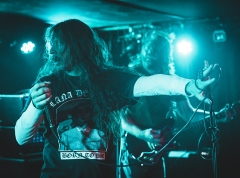
 Twitter
Twitter Facebook
Facebook